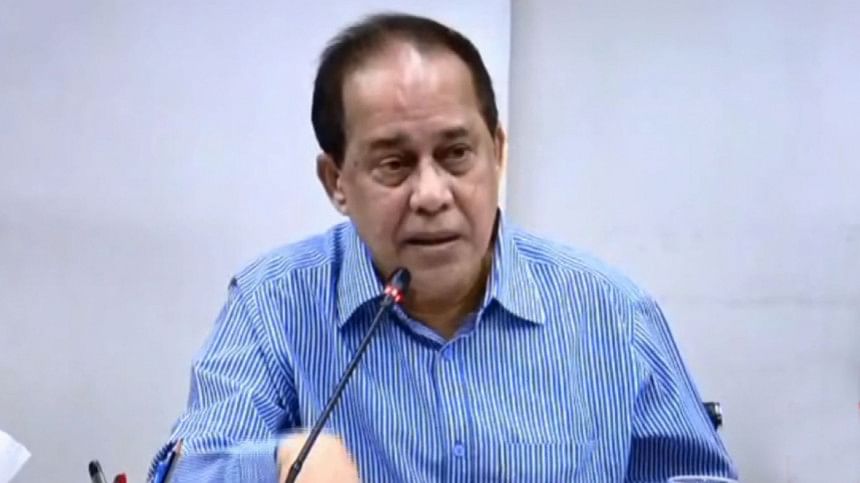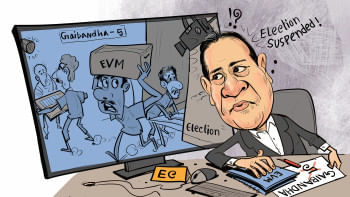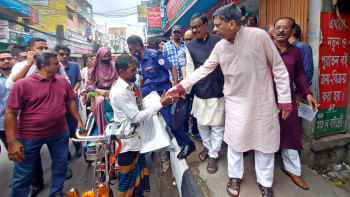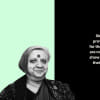What message does the CEC's comment on black money convey?

Elections in Bangladesh come with two things attached: muscle power and vote-buying. Historically, these phenomena have been at the centre of discussions as major contenders accuse each other of committing either or both. And this is where the Election Commission is expected to step in as the custodian of the elections. As the custodian, every word, every action of the commission has a grave significance during an election. While the Election Commission is primarily tasked with holding free and fair elections, that task involves much effort on different fronts, the key among which is earning the trust of the political parties as well as the people of the country. So, people expect election commissioners to be mindful when they speak, when they act, and even when they react.
One recent comment by Chief Election Commissioner Kazi Habibul Awal caught the attention of many. At a discussion with candidates and other stakeholders of the impending Gazipur City Corporation election, the election chief on May 10 said, "Don't worry too much about black money. If you think that you cannot contain the disbursement of black money, tell the recipients [of black money], 'Even if you take black money, cast your vote independently. Vote for the person you believe in and consider good. Because when you cast your vote, the person who gave you black money will not stand beside you…'"
A video clip of his comment went viral on social media. Netizens have been asking whether it behoves the CEC to make such a comment. The remark is all the more significant since it comes at a time when the credibility of this Election Commission hangs in the balance and is being questioned by the opposition political parties. It sounds all the more ominous in the context of the two previous parliamentary elections in 2014 and 2018, which seriously question the independence and neutrality of the election office. Predictably, and quite understandably, political parties have already started expressing their apprehension regarding the comment.
Hardly anyone will disagree that black money has an influence on any election, but a few questions arise from the CEC's comment. First, if the candidates have to stop the disbursement of black money, then what is the role of the Election Commission or the returning officers or the law enforcement agencies? It falls upon them to create a congenial atmosphere for a free, fair and credible election. Obviously, black money is a barrier to that.
The second question that arises from the CEC's comment is: would it instigate the contenders to distribute black money? If his remarks, which could be perceived as directives, are taken to heart, it would do precious little to deter the candidates from buying votes.
The third question is, does this mean that the Election Commission has expressed its helplessness in advance to stop vote-buying? If that is indeed the case, should the incumbent commission continue staying in office and proceed with conducting elections?
According to the city corporation election rules, no gift can be given to the voters and the commission can sentence violators up to six months in prison or charge them with Tk 50,000 fine or both. The rules also stipulate that monetary or any other reward to influence a person to contest as a candidate, not be a candidate, withdraw their candidature, vote, or keep them from voting will be considered as bribery. Both giving and taking bribes are punishable offences. The punishment for this offence is imprisonment from six months to two years or a fine.
At the same meeting, the CEC emphasised the importance of the upcoming Gazipur City Corporation polls, saying that the election was crucial due to the attention it was receiving from the international community. In that case, his comment on black money will surely tarnish the commission's image.
The Gazipur City Corporation election is among the five city polls that are going to be held before the upcoming 12th parliamentary polls. The CEC's comments at such a juncture will certainly not help uphold the commission's dignity, but question its intention and credibility instead.
Politicians can play with rhetoric and expect more latitude for their remarks and comments. The Election Commission cannot.
Mohammad Al-Masum Molla is chief reporter at The Daily Star.

 For all latest news, follow The Daily Star's Google News channel.
For all latest news, follow The Daily Star's Google News channel. 











Comments